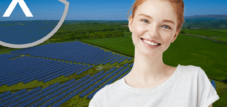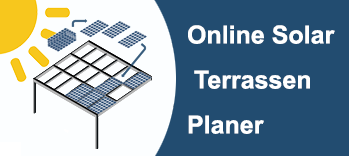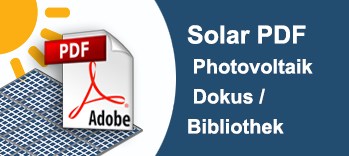47 MW Solarpark Zerbst / Saxony-Anhalt: Germany's largest hybrid solar park project with 16 MW of battery storage capacity
Xpert pre-release
Language selection 📢
Published on: May 31, 2025 / update from: May 31, 2025 - Author: Konrad Wolfenstein

47 MW Solarpark Zerbst / Saxony-Anhalt: Germany's largest hybrid solar park project with 16 MW battery storage capacity-creative image: Xpert.digital
Solar and battery storage project: Innovation for the energy transition
Norwegian energy company Statkraft sets new standards: solar and battery storage project in Zerbst
With its innovative solar and battery storage project in Zerbst/Anhalt, the Norwegian energy company Statkraft achieved an important milestone for the German energy transition. The hybrid power plant, which is created on a former gravel pit with an output of 47 MW solar and 16 MW battery storage capacity, currently represents the largest project of its kind in Germany and is expected to be able to supply around 14,000 households with renewable energy. After successfully maintaining the building permit in August 2024 and the symbolic groundbreaking ceremony in October 2024, the project is now in the active construction phase, whereby the commissioning is planned for the end of 2025.
Technical innovation and project specifications
Hybrid power plant concept as a future technology
The project in Zerbst embodies a state -of -the -art solution to the challenges of the energy transition through the intelligent combination of photovoltaics and battery storage technology. The solar modules will provide 47 MW electrical output and generate almost 52,000 megawatt hours of green electricity annually. The connected battery memory has an output of 16 MW and is designed for a two -hour electricity consumption and delivery, which means that it can save up to 55 megawatt hours of green current. This combination enables excess energy to save during sun -rich hours and to feed back into the network with increased need or less production.
The technical interpretation of the battery storage system is specifically optimized to compensate for fluctuations between power generation and consumption and actively contribute to stabilizing the power grid. Since batteries can provide large amounts of electricity in a short time, they play an important role in compensation for short -term fluctuations in the power supply. Laurent Talbot, Head of Energy Storage at Statkraft, emphasized the strategic importance of such hybrid power plants as a “important component for the successful energy transition in Germany”.
Site optimization and land use
The project extends over an area of about 41 hectares on the site of a former gravel pit east of the city center of Zerbst. This choice of location is advantageous both from an ecological and landscape planning perspective, since the system only minimally intervenes in the landscape by using an area that has already been changed. The area size corresponds to about 60 soccer fields and enables the optimal arrangement of the solar modules for maximum energy yield.
A special feature of the location is the preservation of the lake in the middle of the former gravel pit, which will remain accessible to the neighborhood even after the solar park has been completed. The fencing is designed in such a way that access to the lake remains free, which promotes the acceptance of the project in the local population. The existing paths on the site are used for the development and later maintenance of the system, which minimizes the environmental impact during the construction phase.
Development phases and project realization
Approval procedure and regulatory framework
The path to project realization began with the successful participation in the innovation advertisement of the Federal Network Agency in May 2023. Statkraft was able to prevail against the competition with an affiliated battery with an attached battery and was awarded the contract for the largest covered project in this round of tenders. The Federal Network Agency had advertised a total of 400 MW performance for this bidding date to enable outstanding renewable projects.
The municipality of Zerbst had already decided to set up the corresponding development plan in 2022, which created the planning law basics. After completing the technical planning as well as examinations of species and nature conservation law, Statkraft received the required building permit in August 2024. Claus Urbanke, head of the German wind, solar and memory development of statement, emphasized that the construction of co-location systems from solar energy and battery storage is part of the company's ambitious growth goals in Germany.
Construction phase and schedule
With the symbolic groundbreaking ceremony in October 2024, active construction work began on the site of the former gravel pit. Commissioning is planned for the end of 2025, with which the project has a comparatively short construction period of around 14 months. This efficient implementation is thanks to both thorough preliminary planning and the experience of Statkrafts in the development of renewable energy projects.
The construction work is organized in such a way that the environmental impacts are minimized. A network connection point is a few kilometers away, which facilitates integration into the existing power grid. During the construction phase, the construction site will be surrounded by a fence, but access to the lake in the middle of the gravel pit remains freely accessible. After completion, the fencing is adjusted accordingly to ensure both the safety of the system and the accessibility of the lake.
Environmental and climate effects
CO₂ reduction and climate protection potential
The Zerbst hybrid power plant makes a significant contribution to climate protection through the annual saving of around 32,000 tons of CO₂ emissions. This reduction corresponds to the average annual CO₂ balance of several thousand people and underlines the importance of large-scale renewable energy projects for achieving the German climate goals. The CO₂ savings results from the substitution of conventional, fossil-based electricity generation due to clean solar energy.
Overall, the environmental impact of the project is to be evaluated positively, since it is about the reuse of an already anthropogenic area. The former gravel pit is fed by the solar project of a sensible new use without having to use natural areas. The integration of the battery storage system additionally increases the positive climate effect because it increases the efficiency of solar energy use and contributes to network stability.
Biodiversity and ecological integration
Extensive species and nature conservation law examinations were carried out during project planning to ensure that the ecological effects remain minimal. The preservation of the lake in the middle of the gravel pit contributes to the preservation of the local ecosystem and continues to offer habitat for water birds and other animal species. The solar modules are installed so that there is enough space between the module series to develop a natural vegetation.
The extensive use of the area under and between the solar modules can contribute to promoting biodiversity, since these areas often serve as refugees for different plant and animal species. The reduced human disorder compared to earlier use of gravel pits can have positive effects on local fauna. At the same time, avoiding intensive agricultural use from pesticide and fertilizer entries is prevented in the environment.
Economic and energy -political importance
Contribution to regional energy supply
After completing it, the Zerbster hybrid power plant will be able to supply around 14,000 households with renewable energy. This supply capacity corresponds to a significant proportion of local and regional energy demand and contributes to the decentralization of German energy supply. Local power generation reduces the dependence on national energy imports and strengthens the region's energy safety.
The integration of the battery storage system also enables system services for the power grid. The 16-MW battery storage can be stabilizing in the event of short-term demand for demands or generation failures and contributes to network quality. This ability to regulate the network is becoming increasingly important and valuable in an energy system with increasing proportion of fluctuating renewable energies.
Investment and jobs
The project is a significant investment in the regional economy, even if concrete investment amounts have not been communicated publicly. Statkraft has announced that the construction of co-location systems is part of their ambitious growth goals in Germany, with the aim of putting between 300 and 500 MW of wind, solar and storage capacity per year in the future. This growth strategy signals long -term willingness to invest and could result in further projects in the region.
During the construction phase, temporary jobs are created in the region, and the long -term operation of the system also requires qualified staff for maintenance and service. The settlement of such an important energy project can also have positive radiation effects on other companies in the energy industry and strengthen the region as a location for renewable energies.
Classification in the German energy transition
The torn project is of particular importance against the background of the German energy turnaries. By 2040, the proportion of renewable energies in the primary energy consumption in Germany is expected to be 68 to 85 percent. Saxony-Anhalt lags behind in the country comparison when expanding the solar energy, although a fifth of the stream of solar energy and about a third of wind power comes from. The regional association of renewable energies therefore calls for faster approval processes for photovoltaic systems to achieve nationwide requirements.
The Stat force project demonstrates that large solar projects with connected battery storage are technically feasible and economically presented. It could serve as a showcase project for other similar developments and contribute to the acceleration of solar expansion in Saxony-Anhalt. The Federal Network Agency's innovation advertisement, through which the project is financed, also shows political support for technologically advanced energy projects.
Novel photovoltaic solution for reducing costs and saving time
More about it here:
Scalable solutions: How the Zerbste project transforms the energy industry
From gravel pits to power plants: open up the potential of hybrid energy systems
Technical challenges of hybrid technology
The combination of solar energy and battery storage in an integrated system brings with it various technical challenges. The optimal coordination between solar power generation, battery charge and mesh feed requires sophisticated control systems and energy management software. Stat force already has experience with battery storage technology, since the company has operated a 3 MW battery in Dörverden since 2018 that provides control energy for the power grid.
The long-term stability and maintenance of the battery systems is another challenge, especially with regard to the degradation of the battery cells over the planned operating time of 20-25 years. The development of maintenance strategies and possibly necessary battery exchange cycles must be considered right from the start. At the same time, the project offers the opportunity to gain valuable operating experiences with large -scale battery stores that can be used for future projects.
Regulatory developments and market integration
The successful market integration of hybrid power plants depends largely on the further development of the regulatory framework. The Federal Network Agency's innovation advertisement, through which the Zumpster project is promoted, is an important step to support technologically advanced energy projects. Future design designs must adequately take into account the special properties and advantages of hybrid power plants.
The integration of battery storage into the various electricity markets (spot market, control energy market, capacity markets) requires further regulatory clarifications and possibly new market mechanisms. The possibility of participating in several markets at the same time and offering various system services could significantly improve the profitability of such projects. As an experienced energy retailer, statement is well positioned to take advantage of these market opportunities.
Scaling potential and replication
The Zerbste project can serve as a blueprint for similar developments in Germany and other European countries. The use of former industrial or mining areas for solar parks with integrated battery storage offers considerable scaling potential without any additional land use conflicts. In Germany there are numerous former gravel pits, opencast mine areas and industrial wasteland that would be suitable for similar projects.
Statkrafts announced growth targets of 300 to 500 MW of new wind, solar and storage capacity per year in Germany show the potential for rapid scaling of this technology. The standardization of planning and approval procedures for hybrid projects could further reduce implementation times and reduce the costs. The experience from the Zerbste project will provide valuable findings for the optimization of future developments.
Meaning for the European energy transition
Statkrafts role as a European market leader
As Europe's largest producer of renewable energy, Statkraft brings extensive international experiences into the Zerbster project. The Norwegian state company operates hydropower, wind, solar and storage projects worldwide and has more than 6,000 employees in over 20 countries. These global expertise enables proven practices and innovative technologies from other markets in Germany.
The investment in the Zerbster hybrid power plant is part of Statkraft's wider strategy for expansion to the German market for renewable energies. Germany is considered the key market for the European energy transition, and successful projects such as Zerbst can serve as a springboard for further investments. The combination of technological innovation, financial strength and political support creates favorable conditions for further market development.
Technology transfer and innovation diffusion
The Zerbste project contributes to the diffusion of hybrid power plant technologies in Europe and can serve as a demonstration project for other countries and regions. The operating experiences and technical knowledge gained will not only be valuable for Statkrafts, but can also contribute to the further development of standards and best practice in the entire industry.
The integration of solar energy and battery storage is viewed in many European countries as a key technology for the energy transition. The Zerbster project can serve as a reference for similar developments in other EU member states and contribute to the harmonization of planning and approval procedures. The European dimension of the project also underlines the importance of cross -border cooperation in the development of sustainable energy systems.
CO₂ savings and regional strength: The potential of modern hybrid power plants
The STATRATION Hybrid power plant in Zerbst/Anhalt marks an important milestone for the German energy transition and the integration of innovative storage technologies into the energy system. With a total output of 47 MW solar and 16 MW battery storage capacity on an area of 41 hectares, it currently represents the largest project of its kind in Germany and impressively demonstrates the technical and economic feasibility of hybrid power plants.
The successful project development of innovation advertisement 2023 until the construction of 2024 shows that ambitious energy projects can be realized in appropriate periods with appropriate political support and regulatory clarity. The planned commissioning at the end of 2025 will deliver important operating experiences that will be of great importance for the further development and scaling of this technology.
The comprehensive positive effects of the project-from the supply of 14,000 households with renewable energy to the annual CO₂ savings of 32,000 tons to strengthening regional energy safety-underline the potential of hybrid power plants as a component of a sustainable energy future. The project in Zerbst can serve as a model for other similar developments in Germany and Europe and contribute to the accelerated transformation of the energy system.
We are there for you - advice - planning - implementation - project management
☑️ Construction and advice on photovoltaic open-space systems
☑️ Solar park planning ☑️ Agri-photovoltaic implementation
☑️ Solar outdoor systems with dual-use solutions
Xpert.Solar is your ideal partner for the planning, consulting and construction implementation of ground-mounted photovoltaic systems and agricultural photovoltaic projects due to our many years of experience and expertise in the solar energy industry. Xpert.Solar has an experienced team of professionals that offers tailored solutions to farmers and investors. From location analysis to financial and legal advice to technical implementation and monitoring, Xpert.Solar supports its customers professionally and reliably to ensure successful and sustainable implementation.
I would be happy to serve as your personal advisor.
You can contact me by filling out the contact form below or simply call me on +49 89 89 674 804 (Munich) .
I'm looking forward to our joint project.
Xpert.Digital - Konrad Wolfenstein
Xpert.Digital is a hub for industry with a focus on digitalization, mechanical engineering, logistics/intralogistics and photovoltaics.
With our 360° business development solution, we support well-known companies from new business to after sales.
Market intelligence, smarketing, marketing automation, content development, PR, mail campaigns, personalized social media and lead nurturing are part of our digital tools.
You can find out more at: www.xpert.digital - www.xpert.solar - www.xpert.plus




























